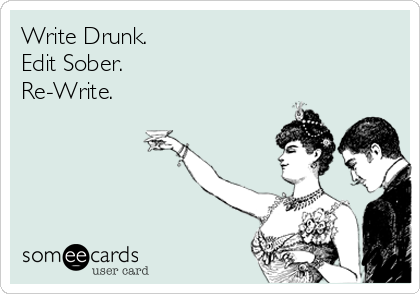“When you work hard all day with your head and know you must work again the next day, what else can change your ideas and make them run in a different plane like whisky?”
One of the things that I always found intriguing in my literature classes was the seemingly overwhelming number of writers that were supposed alcoholics. Whenever we discussed authors such as Ernest Hemingway, Edgar Allen Poe, Truman Capote, or F. Scott Fitzgerald, a discussion of their drinking habits always arose. This got me curious as to if there was any scientific cause behind alcohol and creativity. The fact that these renowned authors frequently drink is simply second hand, anecdotal evidence to the hypothesis that drinking increases creativity. Although this evidence is helpful, I wondered if any relative experiments were ever conducted.
renowned authors frequently drink is simply second hand, anecdotal evidence to the hypothesis that drinking increases creativity. Although this evidence is helpful, I wondered if any relative experiments were ever conducted.
The first experiment that was able to shed light on the subject is know as the Newt/Judge experiment. In this experiment, 18 marketing professionals were split into two teams of 9.”One team was plied with as much alcohol as they wanted, while the other team was assigned a liquid diet that the temperance movement would have approved of.” From there, the two teams were given a task to promote intermittent drinks of water at a bar/club. After three hours of collaboration, the teams handed in their proposals. The team allowed to drink developed 59 ideas in 3 hours while the sober team only proposed 48 ideas. The experiment shows that the inebriated team was more productive, but were their ideas better? The five best ideas from each group were selected and put before a marketing director (who didn’t know whose ideas were whose) to rank. According to a marketing director, the ideas of the “boozer” team were better than the sober team. “The boozers came up with four out of the five top ideas,” concluded the study.
Furthermore, a more scientific study conducted by the University of Illinois had similar findings. The team of psychologist recruited “a target sample of 40 male social drinkers aged 21–30” through Craigslist and the university community. Of their sample, they randomly chose 20 of the subject to stay sober and the other 20 were given alcohol until they reached a BAC of about .075. The alcohol impairs “executive controls” of the intoxicated participants which the suspected causal link to more creative thought. of The psychologist then gave each participant a Remote Associates Test (RAT). According to the report, “The RAT is a commonly used creative problem solving task… participants are given three target words such as PEACH, ARM, and TAR, and are tasked with finding a fourth word, such as PIT, that forms a good two-word phrase with each of the target words. The RAT is thought to involve creative problem solving because the most salient potential responses to the problem are often incorrect, and one must retrieve more remote associates in order to reach solution.” The test basically assess the participants ability to link three words with one word. This is generally a good test because it can easily compare the sober and intoxicated participants. “If reduced executive control does in fact aid in creative problem solving, then participants in the intoxication condition should solve more RAT items than those in the sober control condition, or they may solve them more quickly.” The results revealed that the inebriated participants were more creative because they scored, on average, higher than the sober participants. The study concluded that “the results of the current study supported the prediction that moderate alcohol intoxication would improve performance on a creative problem solving task. Intoxicated participants not only showed an improvement in RAT accuracy compared to sober, WMC-matched participants, but they also solved problems more quickly.” It is suggested that because of alcohols impairment of “executive controls,” the intoxicated subjects did not fixate on a single idea. If a solution became too difficult, they sought an easier solution and found it quickly. 
Although these studies support the hypothesis that moderate intoxication increases creativity, there are many other health related risks that accompany frequent drinking. Many of the authors I previously mentioned suffered the consequences of drinking. For example, F. Scott Fitzgerald died of a heart attack at age 44 (about 18 years younger than the life expectancy of the time), and Ernest Hemingway committed suicide. The heavy drinking a suspected contributing factor to both of theses authors’ fates.

This is so interesting!! It’s weird that alcohol, which tends to impair many other senses and functions, increases people’s creativity. However, it would be interesting to do the same study with a group of people who are alcoholics vs. the sober people. Since they drink so much so often, does the alcohol still simulate the same creativity, or has the alcohol stopped impacting them and therefore they have the same, or even less of, a creativity level than the sober people.